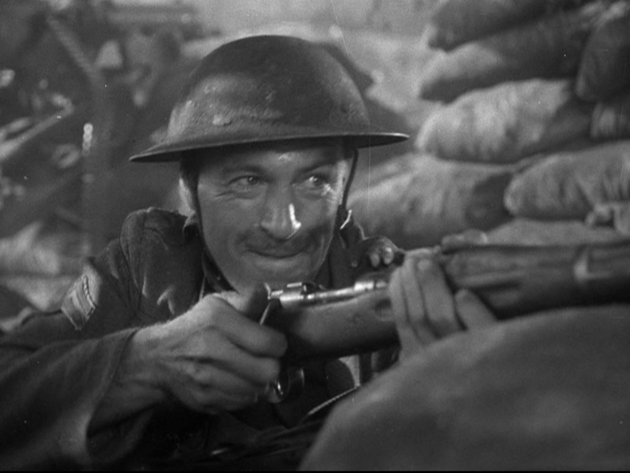In a conversation last weekend, I confused Audie Murphy (one of the most decorated American combat soldiers of World War II) for the main role in the 1941 film classic, Sergeant York (played by Gary Cooper who won an Oscar for the role), because I couldn’t think of the title. A few nuggets about the Congressional Medal of Honor recipient Sergeant York, the man, and the film, which is worth every minute of your time. Just about all of this is from either IMDB or Wikipedia unless otherwise referenced.
- He received the Medal of Honor for leading an attack on a German machine gun nest, taking 32 machine guns, killing at least 20 German soldiers, and singlehandedly capturing 132 others.
- Premise of the film – A Tennessee hillbilly sharpshooter drafted in WW1 despite his claim to be a Christian pacifist, who ends up becoming a war hero.
- York refused, several times, to authorize a film version of his life story, but finally yielded to persistent efforts in order to finance the creation of an interdenominational Bible school.
- The film turned out to be a highly accurate representation of history, mainly because of the studio’s fear of lawsuits. Alvin C. York and several of the townsmen in Tennessee, including the pastor who counseled him, refused to sign releases unless the film was portrayed accurately.
- Alvin C. York had been approached by producer Jesse Lasky several times, beginning in 1919, to allow a movie to be made of his life, but had refused, believing that “This uniform ain’t for sale.” Lasky convinced York that, with war threatening in Europe, it was his patriotic duty to allow the film to proceed. York finally agreed – but only on three conditions. First, York’s share of the profits would be contributed to a Bible School York wanted constructed. Second, no cigarette smoking actress could be chosen to play his wife. Third, that only Gary Cooper, could recreate his life on screen. Cooper at first turned down the role, but when York himself contacted the star with a personal plea, Cooper agreed to do the picture. At one point.
- Ronald Reagan was tested for the role.
- Gary Cooper was initially reluctant about playing a seemingly too-good-to-be-true character. It was only after he met the real Sergeant Alvin C. York that he reconsidered.
- Alvin C. York himself was on the set for a few days during filming. When one of the crew members tactlessly asked him how many “Jerries” he had killed, York started sobbing so vehemently he threw up. The crew member was nearly fired, but the next day, York demanded that he keep his job.
- After Gary Copper won the Oscar and gave his speech, he accidentally left the statue on the podium.
- According to the star himself, this was the first movie Clint Eastwood saw.
- The American Film Institute ranked the film 57th in the its 100 most inspirational American movies. It also rated Alvin York 35th in its list of the top 50 heroes in American cinema.
- Despite his history of drinking and fighting, York attended church regularly and often led the hymn singing. A revival meeting at the end of 1914 led him to a conversion experience on January 1, 1915.
- His company commander and a captain who was a devout Christian cited scripture to have him reconsider his pacifist stance and gave him a 10-day leave to visit home and think it over.
- In a lecture later in life, he reported his reaction to the outbreak of World War I: “I was worried clean through. I didn’t want to go and kill. I believed in my Bible.”
- During World War II, York attempted to re-enlist in the Army, however at fifty-four years of age, overweight, near-diabetic, and with evidence of arthritis, he was denied enlistment as a combat soldier. Instead, he was commissioned a major in the Army Signal Corps and he toured training camps and participated in bond drives in support of the war effort, usually paying his own travel expenses.
- York and his wife Grace had eight children, most named after American historical figures, such as: Woodrow Wilson , Sam Houston , Andrew Jackson, Betsy Ross, Thomas Jefferson
- For 37-years, his son gave tours of the Sgt. Alvin C. York State Historic Park.
- The riderless horse in the funeral procession of President Ronald Reagan was named Sergeant York.

"I didn't want to go and kill. I believed in my Bible."
Paging Warren Jeffress…
One of my absolute favorites. "Jimtown!"
I don't see it in the credits, but I seem to recall from somewhere (wrap-around commentary on TCM, maybe?) that the real Alvin York had a cameo in the film. He played the official at the draft board who told the character York that his deferment as a conscientious objector was denied but he could appeal the ruling